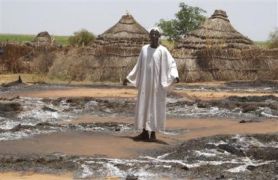Group finds evidence on intentional destruction of livelihoods in Darfur
Feb 17, 2005 — Physicians for Human Rights (PHR), reporting today from a three-week assessment in Darfur, called on the UN Security Council to step up security and establish an International Compensation Commission to provide reparations to Darfurians whose livelihoods have been destroyed by the recent conflict.

|
|
A man from Um Hashab village, North Darfur, gestures his burned hut, after Sudanese military bombarded the village with helicopter gunship on Thursday, August 26, 2004 (AP) . |
Focusing on the village of Furawiya in the northern part of West Darfur, PHR documented the full range of loss of livelihoods, including loss of community, economic structures, livestock, food production, wells and irrigation, farming capacity, and household structures. When this detail is applied to the estimated 700-2,000 villages destroyed in Darfur, the scale and cost of livelihood destruction is enormous. From the air and land, the PHR team also photographically documented the utter devastation of dozens of villages in the southern border with Chad.
The findings bolster PHR’s genocide assessment from its June 2004 investigation along the Chad/Sudan border that highlighted evidence of an organized attempt to affect group annihilation. In particular, PHR’s livelihood study is applicable to Article 6c of the Rome Statute for the International Criminal Court which defines genocide as “acts committed with intent to destroy, in whole or in part, a national, ethnical, racial or religious group, as such deliberately inflicting on the group conditions of life calculated to bring about its physical destruction in whole or in part.”
“Perpetrators of the heinous war crimes committed in Darfur must be brought to justice and PHR urges the UN to send a referral to the International Criminal Court, but prosecuting perpetrators alone will not be enough to restore livelihoods lost,” said John Heffernan who led the most recent investigation. “The non-Arab Darfurians have lost everything, making the prospect of returning without some sort of compensation, even in a secure environment, difficult.”
According to an account by one of the few Furawiya residents who never left his village, nearly all the prewar livestock was lost. The percent of livestock lost as a direct result of the attack was 40% killed and 20% stolen or eaten by attacking Janjaweed forces. Of the remaining animals, 30 died as a result of lack of food and water from either the long trek to Chad or from neglect. Food production for family consumption and for upkeep of their livestock was completely wiped out. Not only were homes attacked, looted and/or destroyed, the crops were also burned. Because of continuing intimidation and regular return attacks against Furawiya (in May, June, July and August 2004 per the UN assessment report), villagers are unable to return home.
PHR team member and medical consultant Dr. Michael Van Rooyen, a humanitarian aid expert at the Harvard School of Public Health, said, “An essential part of survival is community structure. People can’t and won’t return unless their entire village returns. It is vital that the international community and the Government of Sudan take concrete steps to rebuild these people’s lives. ”
Without access to their land there is no home, and no farm. Without the farm there is no way to eat or feed livestock. Without livestock there is reduced access to water and no economy. The continuation of attacks and intimidation has forced the population into the harsh desert to live off of the wild grains and berries. It is only the presence of humanitarian aid organizations that has prevented the starvation and annihilation of the Furawiyan population. This pattern repeats itself across a land the size of France.
To ensure return of people to their homes, save lives and prevent further attacks, PHR calls on the UN Security Council to immediately support:
– An enlarged and more robust African Union force, with increased troops, equipment and strong logistical and financial support from donor nations.
– Disarmament and disbandment of the Janjaweed militia forces by the Government of Sudan with measures to ensure that all parties respect the ceasefire agreement.
– An International Compensation Commission to enable Darfurians to restore their livelihoods. This should include devising a means of holding the Janjaweed militias and the Government of Sudan accountable to return seized lands, provide reparations, and restore plundered and pillaged property, as well as compensation for damaged crops and infrastructure.
– Targeted sanctions on the government of Sudan and others responsible for the ongoing attacks,
– Holding perpetrators accountable by referring crimes committed in Darfur to the International Criminal Court.
Physicians for Human Rights has an extensive collection of high quality photographs of the investigation taken by Academy Award-winning documentary filmmaker Michael Wadleigh. PHR will release its findings, as well as its complete recommendations for action, in an upcoming full report.
Physicians for Human Rights (PHR) mobilizes the health professions to ensure the health and dignity of all people. As a founding member of the International Campaign to Ban Landmines, PHR shared the 1997 Nobel Peace Prize.
For more information please go at http://www.phrusa.org/research/sudan/release02162005.html
